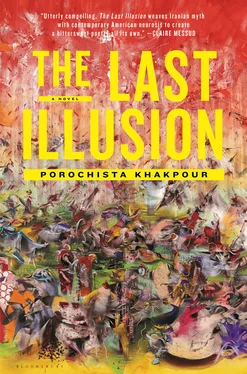Zal groaned. “I’m going in there—”
“Oh, no, sir, she’s gonna be out in a minute. She’s okay. One of our hostesses found her and she’s calming her down. She’ll be right out—”
“I’m her boyfriend, I’ve got to be with her,” Zal protested, pushing past her.
“Sir, men can’t go in there! There are other women in there who wouldn’t like that, sir!” the woman insisted, more firmly this time.
Zal gave up sullenly. “I’ll go back and sit. Will you get her out to me immediately? I’m really worried.”
But back at his seat, he questioned just how worried he was. A panic attack. Here it was again. How had she left like that, without a word, managed to pass out, and gotten herself worked up to the brink of panic again? He reminded himself it was her birthday, so whatever happened, he could not get mad at her.
Soon enough, a large woman in a dark suit was walking Asiya to him. She looked like a little girl in comparison, still so pale, eyes wider than ever, nodding numbly at something the lady was saying as she motioned to Zal and their table.
“Does this young lady belong to you?” the woman said with a big smile, as if awarding them both something spectacular.
Zal nodded. “Asiya, my goodness, what happened—”
Asiya tried to perk up as she sat down. “I’m so sorry. I was feeling a bit funny, and then I guess I fainted, and then I had a bit of an episode. This lady was so nice.”
The woman laughed. “Lucky a hostess found you! I don’t know if a lot of the old gals in there would have noticed. But in any case, glad you’re well. And happy birthday, geez! It can only go up from here, right?”
Asiya nodded, without a smile. The woman went away, and Zal took her shoulder.
“Asiya, I was scared to death,” he said. “Please don’t slip away like that. You could have told me, you know.”
“I didn’t want to make a big thing. I didn’t want to ruin this. And, I know, I ruined it anyway. I’m so sorry.”
Zal felt bad for her. She looked like she was shivering. “You didn’t ruin a thing. Let’s just move on. Do you feel okay enough to stay?”
She nodded quickly. “I’m fine.”
Zal nodded back, believing her. “Let’s get some food in you.”
They focused on their menus — Zal insisting on a huge array of appetizers: a meze platter, guacamole and chips, bruschetta, wild tomato soups, on top of their entrées, which were butternut squash risotto for her and eggplant alla siciliana for him — and after they placed their orders, Zal took her hand, gazing at her until she met his eyes as well.
She looked embarrassed.
“What is it? It’s your birthday, don’t worry. I’m not mad. Don’t be ashamed. It’s really okay! You can do no wrong.”
She shook her head. “That’s not it. It’s just that. .” And she turned red, beet red, something startling on a girl that pale.
He braced himself, ready for anything. “Yes?”
“I got really mad in there. At the hostess.”
“That lady who brought you out?”
“No, the first lady. The hostess with the red glasses. The lady who found me.”
Zal shrugged. “Okay. So why did you get mad?”
“She was shaking me so hard, and I was suddenly awake and I guess out of it or, who knows, just speaking suddenly, and really fast, all these thoughts coming right at me, that I needed to get out, and she was shaking me harder and harder and asking me if I was on drugs!”
Zal sighed, relieved. “Well, I could see why she’d think that, I guess.”
Asiya glared for a second. “It was none of her business.”
“She rescued you, Asiya.”
She made a sour face and shook her head, imperious again. “Well, I rescued her, too.”
Zal was about to ask but instead let go of her hand, wanting to change the subject, wanting to remind himself that tonight of all nights he just couldn’t go there.
But she answered it for him: “I got her fired.”
“What?”
“I told the manager she’d accused me of being on drugs and shaken me so hard I had a panic attack, and the manager yelled at her right in front of me, and said she was done. I saw her leave and everything.”
Zal groaned, trying to control himself. “That’s awful.”
Asiya made that old snort of hers. “Whatever.”
Their appetizers came soon enough, and they ate silently.
“In any case,” she said, nibbling at the bruschetta, many moments later, “I rescued her. You just wait and see. She’s the lucky one, trust me.”
For a second Zal thought to ask what she was talking about, but then got the gist of it. Something apocalyptic. Fine, whatever. He shook his head at nothing in particular and looked out the window, trying to find a moon or even a star, but just saw helicopter and airplane lights. For a moment he wished that when he turned back to the table, Asiya would be gone again.

In the days that followed, Asiya was in bad shape. Her panic attacks occurred daily, and this time, especially debilitated, she took Zal’s advice and lined up doctor appointments. The worst part for Zal was feeling like her latest theory had everything to do with his birthday surprise — though she denied it, insisting that she’d marked the map because she was suspicious all along. It was not just a discovery made at the birthday dinner. She was convinced the World Trade Center had everything to do with the end.
“I can’t hear it anymore,” Zal told her over and over, but with a new gentleness. They were in too deep at that point. There was no use losing her — they were a unit, whether he liked it or not. He was convinced that there was nothing left to do but keep her sane until it passed. And luckily, it was passing soon: she was convinced it would all come to a head in the weeks — from a few to many, it was always unclear to him — to come.
Zal started to think it was time for a job again. He looked at online sites, scanned the classifieds, even asked his father at one point — and made sure to cut the conversation short when it came to anything but jobs. Part of him worried about actually landing something and then leaving Asiya — who had basically resigned herself to living at Zal’s — alone. She had even, at Zal’s prompting, hired a caretaker/housekeeper to tend to Willa and the uptown house daily.
The doctors gave her all sorts of diagnoses: anxiety disorder, panic disorder, depression, agitated depression, unipolar depression. It was nothing she hadn’t heard before.
One suggested schizophrenia and she walked out. Zal had to admit that once he looked it up, he saw where the doctor was going. But Asiya wouldn’t hear it and was quick to remind him, and that doctor, apparently, that the difference between a schizophrenic and herself was the line between delusion and real life. In the end she shrugged it off, assured that there was just a little time left for them to think she was crazy — soon, dangerously soon, it would be clear to them all.
Zal nodded and nodded and looked for more jobs, proofreading his CV over and over, even making his résumé less impressive, wondering if he had the body for manual labor. He desperately needed some other dimension to his life.
And they did what they could, given their situation that summer. They took walks in the park, on the promenade, in most boroughs. They went to outdoor movies at Bryant Park. They went to concerts in Central Park. They ate ice cream, ices, gelato. They went to Jones Beach and Long Beach for sunbathing and swimming. They kissed and had sex and kept each other busy with their very presences. Some days, it even seemed like things were all right in their world.
Читать дальше













